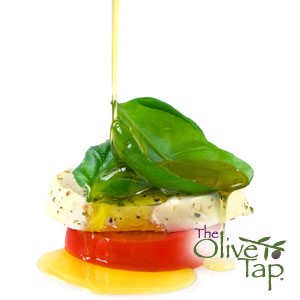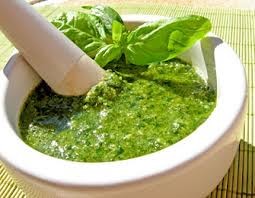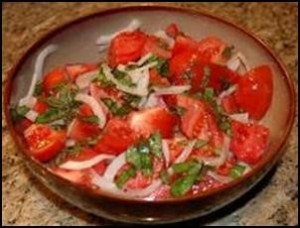It’s Tomato and Basil Time
Let’s have some fun making quick and easy summertime favorites like Caprese Salad, Tomato-Onion Salad and Pesto Genovese. Like most home gardeners here in Illinois Zone 5, I just go foodie-crazy when the Heirloom and other varieties of tomatoes hit their stride. Every day now there are 1 to 3 juicy, ripe, meaty and luscious red beauties ready to pick. For me, the tomato bounty, along with the nearby bushy Italian Basil, and several other herbs and vegetables, inspires me to make Bruschetta, Caprese Salad, Tomato-Onion Salad, and of course Pesto Genovese.
These seasonal favorites, along with a host of others are incredibly quick and easy to make, require few and fairly simple ingredients and most importantly taste fantastic. The shopping list includes: Tomatoes, Red Onion, Fresh Mozzarella (imported Buffalo Mozzarella, if you can find it), Fresh Basil, Crusty Italian Bread, sea salt, fresh ground black pepper, and of course a bottle or two of The Olive Tap’s finest Extra Virgin Olive Oil.
If you are not going to make Pesto, I recommend any of our medium intensity oils, like Italiano, Castile, or Koroneiki. If you plan on making Pesto, and you want to be true to the original recipe, you need to use our Taggiasca 100% Extra Virgin Olive Oil. The Taggiasca variety originated in the coastal region of Northwest Italy called Liguria, and Pesto Genovese gets its name from port city of Genoa, the Ligurian capital. The ultra delicate flavor of Taggiasca is a perfect accompaniment for Pesto and the seafood dishes of the region. Keep in mind, Pesto is about the flavor of the Basil, with the other ingredients lending wonderful flavor and texture notes to the sauce. If you substitute, make sure you use a light tasting EVOO, or even a neutral flavored oil like our buttery Avocado Oil ,or Grapeseed Oil.
We have several Caprese Recipes on our website, just go to the recipe section https://theolivetaprecipes.com/recipes/ and type Caprese in the search box.
Caprese Salad
My simple, and the most common recipe, is to take a thick slice (1/3 inch thick) of ripe red Tomato, covered with a thick slice of fresh Buffalo Mozzarella and some Basil sliced Chiffonade* style. Top with some flake sea salt, fresh ground black pepper and your favorite The Olive Tap EVOO.
In Italy and especially on Capri where it originated you would never see Balsamic Vinegar added to a Caprese Salad. However, it is a common occurrence here in the US. If you are going to do it, I recommend The Olive Tap;s thicker Aceto Balsamico di Modena, Riserva or our Fig Balsamic Vinegar Pour a few drops directly on top of the tomato, then top with the cheese and then the basil. If you pour directly on the cheese, it will run, and while the overall flavor will be fine, it will discolor the cheese making the dish less visually appealing. I have seen several professional chefs put a few drops of thick balsamic on the side of the plate so that those that want some sweet Balsamic Vinegar can dip forkfuls into it.
*Whole leaf shown. If you don’t know the Chiffonade technique, check out this educational video on Youtube. It is a well done lesson. http://www.youtube.com/watch?v=yJEQFgfv7iw
About Pesto
Pesto originated in the Ligurian region of Italy, but its roots go back to Roman times. The first published recipe dates back to 1863, but Pesto was a well known sauce for hundreds of years earlier. The most common and most famous of Pestos is known as Genovese (Genoese). It has traditionally been made by combining Italian Basil, garlic, Taggiasca Extra Virgin Olive Oil, Pine Nuts, and a hard cheese like Grana Padana, or 50-50 combination of Parmigiano Reggiano and Pecorino. Pesto Sicilian (Sicilian Pesto) is similar to Genovese in some respects, but contains a lesser amount of Basil, and has tomato added. In Provence, France, “Pistou” as it is called is usually a combination of basil, parsley, crushed garlic, and grated cheese. Nuts are not included. While Pesto was traditionally made by grinding the ingredients in a marble mortar using a wooden pestle, today, most cooks use a food processor. Once made, pesto should last about 5 days in the refrigerator.
As a sauce, Pesto can be spooned over your favorite pasta for a delicious entrée or side dish. It can be spooned over Crostini, or fresh bread and is a great addition to grilled chicken or chops. Of course, with Tomatoes being so plentiful, try stuffing one with a mixture of pesto and some bread crumbs and either grill or bake in the oven.
Here is a fairly common Pesto Genovese Recipe. If you find Pine Nuts to be too expensive or hard to find, I have seen several recipes that use Cashews. The Olive Tap Taggiasca is absolutely the best Extra Virgin Olive Oil to use, but in a pinch you can substitute an alternative “very lightly flavored” EVOO.
Pesto Genovese
2 cups fresh basil leaves lightly packed, approximately 2 ounces by weight
2 Tablespoons pine nuts, raw or lightly toasted
2-3 cloves garlic
1/3 cup The Olive Tap’s Taggiasca 100% Extra Virgin Olive Oil
1/2 cup freshly grated Grana Padana, Parmesan, or a Parmesan-Pecorino mix cheese
Rinse and dry the basil leaves. Peel the garlic and place it with the basil, pine nuts, salt, and olive oil in a food processor. Run the processor until the mixture is smooth and creamy. Remove the processed Pesto from the processor to a non-metallic bowl and blend in the grated cheeses with a wooden spoon or rubber spatula. Makes just less than one cup of pesto.
Tomato Onion Salad
Making a Tomato-Onion salad is very easy and for me a very nostalgic dish. As a child living next door to Nana, we always had access to fresh ripe tomatoes. Dad would slice 2 or 3 large tomatoes and a medium sized onion, and would top them with some fresh Basil and Oregano to taste. Dressed with nothing more than some high quality Italian EVOO, salt and fresh ground black pepper it became my childhood favorite. I especially enjoyed dipping Nana’s always fresh baked bread into the juice and oil that collected in the bottom of the salad bowl.
Bon Appétit, and remember to try these recipes soon! Especially for us Northerners, those juicy ripe red tomatoes and the bushy Basil plants in the yard will be gone in under 60 days. By late November, we will be stuck with tasteless, hard, store bought tomatoes and you will have to pay dearly for fresh Basil.
Rick Petrocelly Copyright 2013, The Olive Tap









